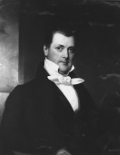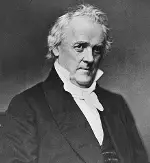President James Buchanan
James Buchanan was a prominent statesman and the 15th President of the United States, remembered more for his failure to stop the Civil War than for his political acumen and experience.. Buchanan was born on April 23, 1791, in Stony Batter, Cove Gap, Pennsylvania. His father, James Buchanan, Sr., and mother, Elizabeth, had 11 children in all. James Sr. was an Irish immigrant who arrived in America in 1783 and made a good amount of money in real estate. The family later moved to Mercersburg. James, Jr. went to school at Old Stone Academy and then Dickinson College. He was expelled once for bad behavior but, thanks to an intervention of his minister, was reinstated and eventually graduated with honors in 1809. He went to Lancaster to study law under the well-known lawyer James Clemens Hopkins and then was admitted to the bar in 1812. Also in that year, he fought in the War of 1812, joining the Pennsylvania militia and fighting in defense of the city of Baltimore. 
An early member of the fading Federalist Party, Buchanan had early political aspirations and got himself elected to the Pennsylvania House of Representatives in 1814. He served some time there and then moved up to the federal level, winning a seat in the U.S. House in 1820. He served in the House for a decade and then, after Andrew Jackson was re-elected in 1832, accepted the appointment of Minister to Russia. Buchanan, as a Federalist, had espoused nationalist policies; when that political party dissolved, he began to support states' rights and aligned himself with the Democratic Party, joining Jackson in his opposition to the Second Bank of the United States. He supported the idea of Manifest Destiny and the annexation of Texas and the Oregon Territory. Buchanan served in that capacity for two years, then returned home to run for the U.S. Senate. He won election in 1834 and was re-elected, leaving his post in 1845 to take up the responsibilities of Secretary of State, as nominated by President James K. Polk. Buchanan's last pre-Presidential post was as Minister to Great Britain. Named by President Franklin Pierce to that post in 1853, he served for three years. He was offered a seat on the U.S. Supreme Court more than once but declined each time. He wanted to be President. Buchanan put his name in the ring in 1848, but the Democratic Party chose Lewis Cass as their standard-bearer. Cass lost the election to Zachary Taylor. Buchanan emerged as a leader contender in 1852 but again was passed over, in favor of eventual winner Pierce. It was finally Buchanan's turn, in 1856. He was the most experienced statesman in the Democratic Party, and he had been living abroad while the controversial events surrounding the adoption of the Kansas-Nebraska Act had played out. The Whig Party had faded away and been replaced as a major political party by the Republican Party. This party had formed only in 1854 and had adopted the abolition of slavery as one of its major campaign issues. The Southern states lined up solidly behind Buchanan, and he got enough support in the North to win the presidency. 
Buchanan nearly died from an illness that he caught not long after the election and then faced significant challenges as President. The Dred Scott, which intended to declare once and for all that slaves were property, occurred early in 1857, Buchanan's first year in office. Opposed personally to slavery, Buchanan believed nonetheless in the idea of Popular Sovereignty, that it should be left up to the residents of each individual state to decide whether they would allow slavery within their borders. On a more personal note, Buchanan is known to have bought slaves in Washington, D.C., with his own money and then taken them to Pennsylvania to set them free. Buchanan, who had earlier supported the Compromise of 1850 (including a strengthened Fugitive Slave Law) as a means of keeping the peace, also became involved in the issues consuming "Bleeding Kansas," the Midwestern state that was a microcosm of the battle over slavery and sovereignty that was consuming the nation as a whole. The Kansas-Nebraska Act had, in 1854, created the Kansas Territory and the Nebraska Territory and then, repuduating the Missouri Compromise had said that states, not Congress, would decide on whether they would allow slavery. Kansas had dueling groups struggling for supremacy, with so-called "border ruffians" from neighboring Missouri crossing into Kansas Territory to stir up trouble, encourage a pro-slavery constitution, and even vote on such matters. The Lecompton Constitution was the product of a pro-slavery convention in the town of that name, and Buchanan urged Congress to accept that document as the blueprint of the new state of Kansas. The Senate agreed, but the House did not. The result was a call for a new constitution; by this time, the anti-slavery group in Kansas had more sway and it was that constitution that was submitted to voters in another election. A majority of voters approved the anti-slavery constitution, which was submitted to Congress and accepted. Also in 1857, the country suffered through a severe economic downturn, known as the Panic of 1857. Buchanan took no action to alleviate concerns. He also vetoed the Homestead Act (which eventually became law under President Abraham Lincoln. And, he sent the U.S. Army to intervene in a dispute over the governorship of the Utah Territory. The Dred Scott decision had enraged the abolitionists across the country, and the Republican Party gained control of the House after the 1858 Congressional elections. The next year, the fiery abolitionist John Brown led a drive to seize the federal arsenal at Harpers Ferry, with the express intent of arming slaves so that they might rise up in armed rebellion. Buchanan supported the idea of stopping Brown from seizing the arsenal's array of weapons and sent a company of Marines, led by Robert E. Lee, to capture Brown. Buchanan continued to insist that the slavery issue would no longer be contentious if states could just be allowed to decide for themselves. He had selected as his Cabinet a mix of Northern and Southern men. Nothing he seemed to do worked, and his refusal to act in certain situations made things worse. Deeply unpopular, Buchanan declined to run for re-election. (In fact, when elected, he had promised not to run again.) Lincoln won the presidency in November 1860. Not long afterward, with Buchanan still in office, seven Southern states seceded from the Union. Buchanan believed that the states had no legal right to leave the Union, but he also believed that he had no legal power to stop them. He belatedly ordered military support for Fort Sumter, but it arrived too late. He retired to Lancaster, Penn. He played no role in public affairs after he left the White House, except to make known his support for Lincoln throughout the horrors of the Civil War. In private, he went to work on what he hoped would be a vindication of himself and his work. Mr. Buchanan's Administration on the Eve of Rebellion was published in 1866. Buchanan died of pneumonia on June 1, 1868. He was working on an autobiography. Buchanan did not marry and did not have children. He was engaged to Anne Caroline Coleman in 1819. Before they could marry, however, she died. While Buchanan was President, his niece, Harriet Lane, carried out the duties of First Lady. |
|
Social Studies for Kids
copyright 2002–2024
David White


